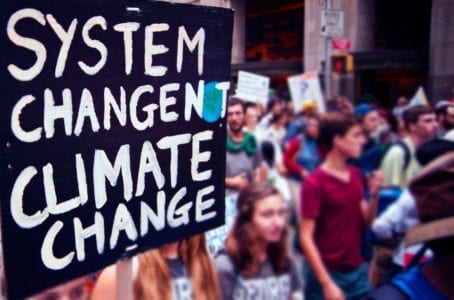Facing the discursive power game: The link between democracy and shared prosperity
Amidst growing interest in deliberative citizens’ assemblies on climate change, the link between democracy and sustainability has become a hot topic. To protect both at a time of high political tension, we must refrain from treating democracy as a mere instrument employed from the top down, and instead advance genuine democratic renewal as the necessary basis for taking people along in the fundamental societal transformations ahead.

The link between democracy and sustainability has become a hot topic. Within this long-standing debate, climate movement Extinction Rebellion’s call for a deliberative citizens’ assembly marks a significant turning point: thus far, apocalyptic outlooks on the environment have tended to come with calls to abandon democracy, not deepen it further. Now the climate crisis is coming to a head at the same time as democracy is being eroded across the world: elections are being interfered with, voters are being manipulated, and the populists that are gaining power as a result deliberately stoke the destructive fires of scapegoating and othering. Even as their country is burning and thousands are losing their livelihoods, elected leaders choose to bow to wealthy business lobbies over acknowledging and fighting the climate crisis. Thus, much now rides on how we understand the role of democracy in the governance of sustainability. The current time could prove a great opportunity for consolidating once and for all the understanding that big challenges such as the climate threat can only be successfully addressed democratically; or it could be the beginning of a simultaneous ecological and social collapse, with devastating consequences for people (and ecosystems) around the globe.
On the one hand, we hear warnings like that from scientist James Lovelock, saying climate change might be as big a threat as a war, thus warranting putting democracy on hold. Authors such as David Shearman and Joseph Smith blame democracy for societies’ failure to address climate change. News commentaries about the extent of the ecological crisis call for ‘strong leaders’ to protect us. The argument is that people’s whims get in the way of following an enlightened elite’s—scientists’, central governments’—responsible leadership out of the crisis.
Scientific expertise and leadership clearly play an important role in navigating a time of ecological threat. However, we know by now that making citizens—as consumers—feel individually at fault is itself a tactic to divert responsibility for the crisis away from its structural and politico-economic causes; and that modern democracies are not genuinely responsive to citizens’ concerns for the same interest-driven reasons. Greater democratic scrutiny, and more effective channels for citizens to make their voices heard, are needed here. There also is truth in democracy being threatened in times of crisis in that feeling threatened can bring out psychological reactions in people that make democratic inclusiveness harder; for example, feeling threatened makes people fall prey more easily to scaremongering and scapegoating tactics. Yet the solution to divisiveness and populism at such times of crisis is more democracy—more coming together as communities across difference, and deliberating concerns openly –, not less. That populist leaders around the world are succeeding at preying on these feelings shows that democratic engagement is lacking.
As a result, the scholarly as well as public interest in democratic renewal is flourishing, too. To counter both superficial responses to the climate crisis and the divisive politics they elicit, we need to recognise the climate crisis as not just a one-off external threat that could be ‘won’ (like a war) and for which some ‘other’ can be blamed, but as a symptom of a fundamental need to change course as a society towards a more sustainable way of relating to the natural world. From this recognition follows an interest I share with many esteemed colleagues in exploring new, deeper forms of democracy as an arena in which citizens’ hearts and minds can be reached in such complex times, and perspectives changed as a result of learning from each other.
However, as interest in new forms of democracy grows, it is important to recognise that the way in which we insist on democracy matters. Using innovations such as deliberative citizens’ assemblies as instrumental tools to support a particular ecological agenda risks inadvertently playing into the hands of the democracy-critical camp, for it is only contingent support for democracy. What is really needed in the threatening times today is unfettered support for democracy as an intrinsic good for society.
A recent example of this debate is my critical exchange with John Dryzek and Jonathan Pickering, following the publication of their book The Politics of the Anthropocene (Oxford University Press, 2019). In this book Dryzek and Pickering call for deliberative democracy as the best way to govern the ‘Anthropocene’—the reality that humanity has become the main driving force of planetary ecological change. They argue that the signature problems of the Anthropocene—such as climate change—are the product of the institutions of the preceding Holocene epoch, which structurally repressed ecological concern and prioritised economic gain. The antidote to the path dependencies originating in these institutions is ‘ecological reflexivity’: the capacity to rethink values and practices in light of ecological information. Deliberative democracy – that is, a form of democracy in which it is the quality and inclusiveness of communication that matters, and that therefore takes place in spaces such as citizen assemblies rather than just the electoral process – supports this by inducing reflection in the political process and widening communication beyond human interest.
Important though this argument is, its weakness is its instrumental, strategic treatment of deliberative democracy. The theory of deliberative democracy originally called for inclusive dialogue and critical questioning as a way of curbing illegitimate power—such as the power of governments to prioritise business interests over citizens’ concerns. In contrast, Dryzek and Pickering advocate deliberation as a strategic tool with which to promote what they deem ‘successful’ ideas and influence the public discourse in what they deem the right kind of ‘formative agency’ towards sustainability. From my perspective of having made a very similar argument about the need for democratic reflexivity before, but with an intrinsic rather than instrumental treatment of deliberative democracy, their argumentative strategy is problematic for two reasons. First, tying the value of deliberation to its usefulness in realising a substantive goal means it will be called upon only for as long as it is the best tool for this; logic dictates that if a different tool (say, an authoritarian approach) were found to be more effective, this would need to be preferred after all. Second, describing deliberation as a tool towards the strategic manipulation of discourses makes it vulnerable to being co-opted by those who do this maliciously precisely to undermine democracy at present. A more compelling argument would call for deliberative democracy not as a strategy to bring about a specific political goal, but rather to as an open-ended process through which politics becomes innately more reflective and legitimate—which, given the role of power- and interest-driven politics in (re)producing ecological crisis, can then be expected naturally to lead to more sustainable outcomes.
Such an account I provide in my new article ‘Sustainability as a cultural transformation: the role of deliberative democracy’. Like Dryzek and Pickering, I argue sustainability must be understood as a process of reflexive transformation, and deliberative democratisation is central to its governance. However, the reason for this is not that deliberation can be used as a tool to promote particular visions of sustainability. Rather, deliberation is intrinsically valuable as a momentum that counteracts the power- and interest-based manipulation of discourses that has so far prevented real political commitment to a societal transformation to sustainability. In its original critical variant, deliberative democratisation provides the political foundation for a critical questioning of the course modern societies have taken, and the imagination of alternative visions of prosperity arising from the bottom up.
The article is a contribution to a CUSP-edited special issue on the politics of sustainability beyond what Daniel Hausknost calls the ‘glass ceiling of transformation’. We suggest that considerable progress has been made in environmental policy-making in advanced democracies, but it hits an impenetrable ‘glass ceiling’ that prevents the actually necessary, much more fundamental transformation of our societies—for instance, beyond the growth economy. I argue one dimension of this glass ceiling is cultural in nature: set by a given construction of social reality, in the form of the ‘political grammar’ of discursive terms that invisibly constrains the society’s imaginative horizon. This means responding to threats like climate change, and transforming the society as radically as is needed for true sustainability, demand not just scientific expertise and technological change, but also a new discursive and imaginative engagement. Sustainability requires new cultural ‘meaning-making’: new semantic meanings beyond the constrained political grammar and vocabulary of liberalism; and new normative meanings in the sense of visions of sustainability that are meaningful to people, as opposed to forced onto them from the top down. That way, even radical change becomes less threatening, and thus more compatible with an inclusive, democratic outlook. Whereas environmental politics is often directed at motivating behaviour change in citizens—such as changes in consumption behaviour –, a cultural transformation goes much deeper than this. It requires democratic deliberation as a space of critical thinking, confrontation with alternative views, and a sense of openness of the society’s future such that citizens can play an active role in shaping it against those with a vested interest in the unsustainable status quo.
The discussion is no longer just about ‘democracy versus authoritarianism’. Democracy has itself become sucked into the discursive power game around the meanings that condition how we talk politically about sustainability. If we are not careful, the current interest in citizens’ assemblies on climate politics will reduce deliberative democracy to a narrow tool at the disposal of those seeking to influence the terms of the societal debate—at best benevolently, but likely also maliciously. What will retain deliberation as an inclusive, democratic momentum for unmasking and challenging this very power play is to treat it not as one particular tool (such as professionally run citizens’ assemblies), but as a broad societal space accessible to citizens from the bottom up and comprising a range of different practices of reflection, dialogue and critical contestation.






